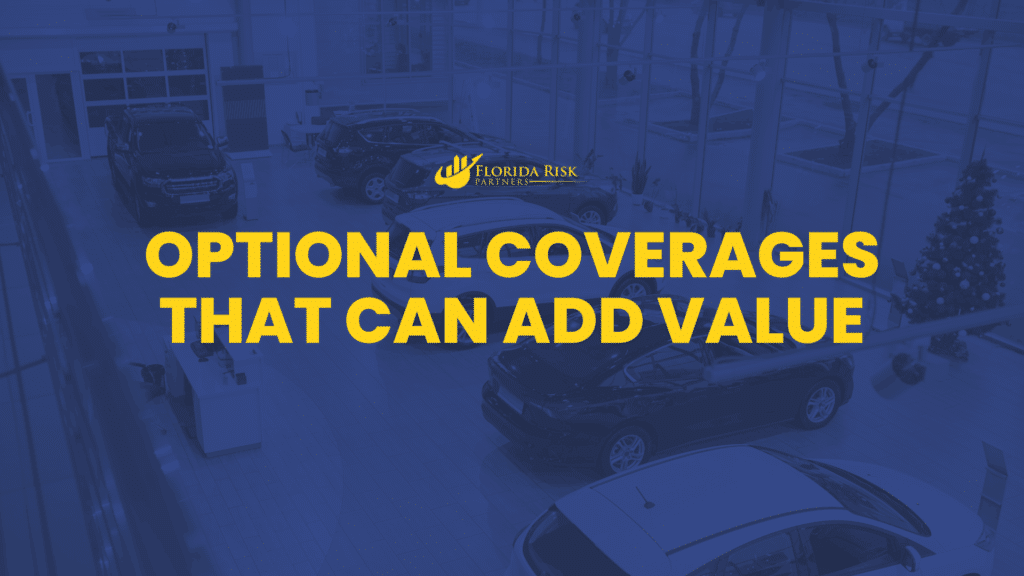-
Main Office: 1434 E. Bloomingdale Ave Valrico, FL 33596-6110
-
Phone: (888) 601-6660
-
Email: info@floridariskpartners.com
What Every Florida Driver Needs to Know About Coverage Basics

If you’re new to the Sunshine State or have lived here for years, you may find Florida’s auto insurance system confusing. Florida uses a no-fault insurance system, unlike most states, which comes with unique rules about handling claims and the required coverage.
In this post, we’ll break down the core components of Florida auto insurance requirements, explain the meaning of “no-fault,” and help you understand the mandatory and optional coverages every driver should know.
What Is Florida’s No-Fault Insurance System?
Florida is one of only a few states that uses a no-fault insurance system, meaning that your own insurance pays for your medical expenses after an accident, regardless of who caused it. This is designed to reduce delays in payment and limit small claims from clogging the court system.
The foundation of Florida’s no-fault system is Personal Injury Protection (PIP) coverage. Every driver is required to carry a minimum of $10,000 in PIP, which helps cover:
- 80% of necessary medical expenses
- 60% of lost wages
- $5,000 death benefit (if applicable)
This applies to injuries sustained by you, your passengers, or any eligible insureds, such as family members living in your household.
But here’s the catch: PIP has limits, and it doesn’t pay for everything. If your injuries exceed $10,000 in medical costs, you’re responsible for the balance unless you have additional coverage or health insurance.
Want a quick overview of required and optional coverage? Download our Florida Car Insurance Basics Guide.
What Coverage Is Required to Register a Car in Florida?
To register your vehicle in Florida, you must maintain:
- $10,000 in Personal Injury Protection (PIP)
- $10,000 in Property Damage Liability (PDL)

These are the minimum coverage requirements in Florida, and you must carry them continuously—even if your car isn’t being driven. If your policy lapses, the Florida Department of Highway Safety and Motor Vehicles (FLHSMV) may suspend your registration and driver’s license, and impose fines.
What’s not required? Unlike most other states, Florida does not require drivers to carry Bodily Injury Liability (BIL) coverage unless they’ve been involved in certain serious driving offenses. That means if you injure someone else in an accident, and you don’t carry BIL, you may be personally liable for their medical expenses, legal fees, and damages.
Common Auto Insurance Coverages in Florida (Beyond the Minimum)
While meeting the state minimum is necessary for compliance, it’s usually not enough to fully protect you. Here are additional coverages Florida drivers should strongly consider:
Bodily Injury Liability (BIL)
Even though it’s not legally required for most drivers in Florida, BIL is essential if you want to protect your assets. It covers injuries to other people if you’re found at fault in an accident. Without it, you could be sued personally.
Recommended Limits: At least $100,000 per person / $300,000 per accident
Uninsured/Underinsured Motorist Coverage (UM/UIM)
Florida has one of the highest rates of uninsured drivers in the nation. If you’re hit by someone who doesn’t have enough insurance (or any at all), UM/UIM coverage pays for your medical expenses, pain and suffering, and lost wages.
Want to learn more about UM protection? Read our post on uninsured motorist coverage in Florida.
Comprehensive and Collision Coverage
If you want to protect your own vehicle from damage, you’ll need to carry comprehensive and collision insurance. These are often required by lenders if you have a car loan or lease.
- Comprehensive pays for non-collision incidents like theft, vandalism, hail, and flood damage
- Collision pays to repair your car after a crash, regardless of who caused it
These coverages come with deductibles (typically $250, $500, or $1,000), so you choose how much you want to pay out of pocket in a claim.
Optional Coverages That Can Add Value

There are also optional Florida car insurance coverages that might make sense for your situation, including:
- Medical Payments (MedPay): Covers medical expenses beyond PIP
- Rental Reimbursement: Pays for a rental car while yours is being repaired
- Roadside Assistance: Helps with towing, lockouts, or dead batteries
- Gap Insurance: Covers the difference between what you owe on your car loan and the vehicle’s actual value if it’s totaled
These extras often cost just a few dollars per month and can save hundreds in the event of a claim.
What Happens After an Accident in Florida?
After a crash, file a claim with your own insurance company, regardless of fault. Your PIP coverage pays medical bills up to $10,000. If the at-fault driver causes injury and your expenses exceed PIP, you can file a liability claim. But, your injuries must meet the “serious injury threshold” under Florida law.
The no-fault system offers immediate relief, but serious accidents often expose coverage gaps. Reviewing and enhancing your policy is critical to ensure adequate protection.
Don’t Settle for Minimum Coverage – Know Your Options
Too many Florida drivers assume that meeting the state’s minimum requirements fully protects them. In reality, $10,000 in PIP and $10,000 in property damage coverage won’t go far in a serious accident—especially with rising medical care and vehicle repair costs.
Understanding your coverage options and what they actually protect can help you avoid devastating financial consequences down the road.
Need help reviewing your policy? Schedule a free Florida auto insurance review with one of our licensed agents—we’ll walk you through your coverages, explain your options in plain English, and help you find the right balance of price and protection.
Coming Next Week: What Really Affects Your Car Insurance Rate
In next week’s post, we’ll explore the top seven factors that impact your Florida auto insurance premium—including a few that might surprise you. Understanding how insurers set your rate helps you take control of your budget.
Until then, stay safe on the roads and stay informed.
Call Us Or
Schedule an Appointment
Select an agent below to view our online calendars and select a day and time that works best for you or call us directly at 888-601-6660. When you use our online calendars, you will receive an email with more information.



